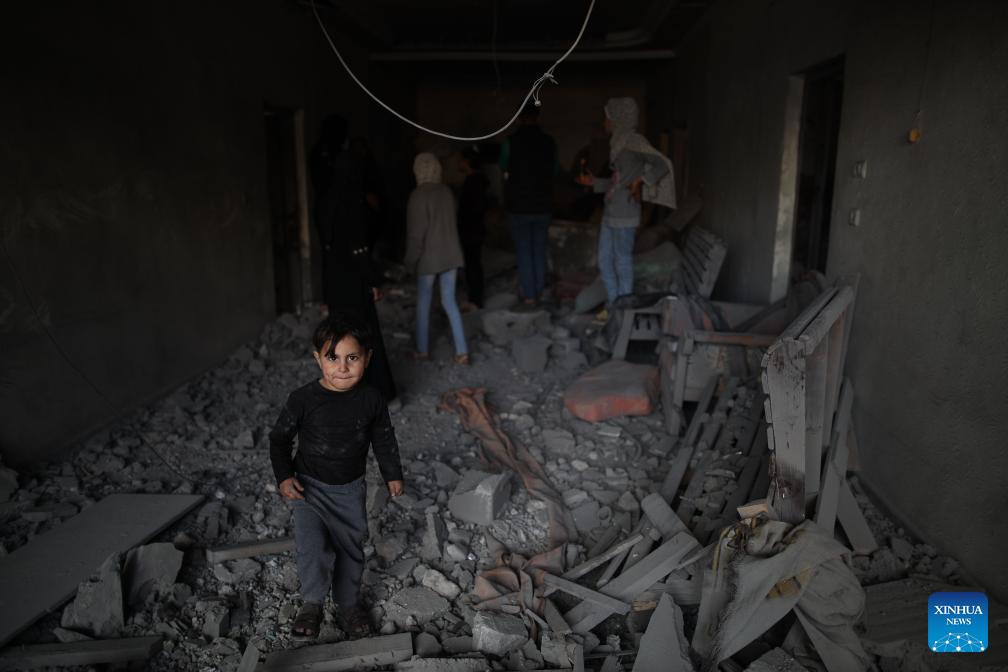
 0 Comment(s)
0 Comment(s) Print
Print E-mail Xinhua, March 25, 2024
E-mail Xinhua, March 25, 2024

A Palestinian boy checks the debris of a building after Israeli airstrikes in Deir al-Balah in the central Gaza Strip, March 24, 2024. [Photo/Xinhua]
U.S. Secretary of State Antony Blinken had concluded his visit to Israel, the last leg of his sixth Middle East tour since the outbreak of the Israeli-Palestinian conflict. Predictably, his efforts fell short of securing a ceasefire.
Despite Washington's rhetoric about seeking a ceasefire, its steadfast backing of Israel's relentless airstrikes on Gaza not only underscores its complicity but also reveals a stark absence of sincere commitment to resolving the conflict and safeguarding innocent lives.
Blinken has repeatedly professed appeals to Israel to minimize civilian casualties in Gaza over the past five months. However, Washington has vetoed UN resolutions calling for a ceasefire four times during the same period. Additionally, it has supplied Israel with billions of U.S. dollars in unconditional military aid and hindered diplomatic endeavors aimed at holding Israel accountable under international law.
Such a paradoxical position was also revealed in Blinken's remarks on Thursday in Cairo, the Egyptian capital, where he met with top diplomats from Egypt, Jordan, Qatar, Saudi Arabia and the United Arab Emirates.
"We're committed to Israel's right to defend itself and to making sure that it has what it needs to defend itself and to make sure that Oct. 7 never happens again," Blinken said. "We're also committed to doing everything we possibly can to help people who are in harm's way."
This stance raises serious doubts about Washington's ability to effectively address the humanitarian crisis in Gaza, particularly when its weapons, provided to the Israeli army, contribute to the ongoing conflict.
Examining the measures implemented recently by the U.S. administration to alleviate the humanitarian crisis in Gaza reveal efforts focused more on addressing the symptoms rather than the root causes.
For instance, Washington announced plans to construct a temporary port off Gaza's coast to enhance the delivery of humanitarian aid, which was criticized by Al Jazeera, a news organization based in Qatar, as "an attempt to divert attention from hundreds of thousands of starving Palestinians and Israel's consistent blocking of assistance to the enclave."
"Airdrops, temporary seaports and the like are not realistic or lasting solutions to stave off looming famine and sustain life in Gaza," Al Jazeera quoted Melanie Ward, the CEO of Medical Aid for Palestinians, as saying earlier this month, noting "only an immediate and lasting ceasefire will allow us to deliver the massive humanitarian response that is required."
The Gaza Strip has already witnessed the loss of approximately 32,000 Palestinian lives, with over 74,000 others sustaining injuries, according to figures released by the Gaza-based Health Ministry.
Protesters in the Middle East have marched and burned U.S. flags to express their outrage at civilian deaths in Gaza, which are frequently indirectly attributed to the U.S. due to its military support of Israel, a glaring illustration of America losing credibility in the Arab world.
As civilian casualties in Gaza mount, Washington must cease the charade of portraying itself as a mediator of peace and instead cooperate with the international community to advocate for genuine peace and stability in the region.
Go to Forum >>0 Comment(s)